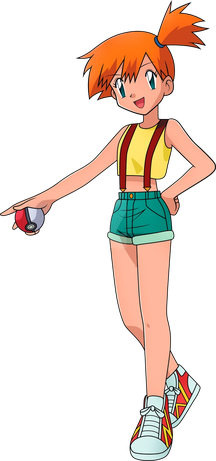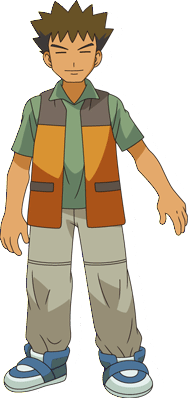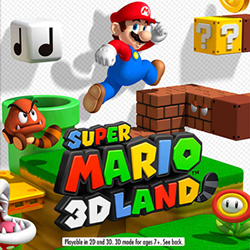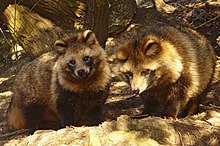
The Game Boy Advance (GBA) is a 32-bit handheld game console developed, manufactured and marketed by Nintendo as the successor to the Game Boy Color. It was released in Japan on March 21, 2001, in North America on June 11, 2001, in the PAL region on June 22, 2001, and in mainland China as iQue Game Boy Advance on June 8, 2004.

Pikachu is a fictional species of the Pokémon media franchise. Designed by Atsuko Nishida and Ken Sugimori, Pikachu first appeared in the 1996 Japanese video games Pokémon Red and Pokémon Green created by Game Freak and Nintendo, which were released outside of Japan in 1998 as Pokémon Red and Pokémon Blue. Pikachu is a yellow, mouse-like creature with electrical abilities. It is a major character in the Pokémon franchise, serving as its mascot.

Jigglypuff, known in Japan as Purin, is a Pokémon species. Jigglypuff first appeared in the video games Pokémon Red and Blue and subsequent sequels, later appearing in various merchandise, spinoff titles and animated and printed adaptations of the franchise. Jigglypuff is voiced by Rachael Lillis in English and by Mika Kanai in Japanese. In the live-action musical Pokémon Live!, Jigglypuff is portrayed by Leah Smith. Jigglypuff is also known for singing a lullaby in the Pokémon anime series.

Eevee is a Pokémon species in the Pokémon franchise. Created by Satoshi Tajiri and designed by Motofumi Fujiwara, it first appeared in the video games Pokémon Red and Blue. It has later appeared in various merchandise, spinoff titles, as well as animated and printed adaptations of the franchise. It is also the game mascot and starter Pokémon for Pokémon: Let's Go, Eevee!

Misty, known as Kasumi (カスミ) in Japan, is a fictional character in the Pokémon franchise owned by Nintendo and created by Satoshi Tajiri. She has appeared as a Gym Leader in the Pokémon video games Pokémon Red and Blue, Pokémon Gold and Silver, and their respective remakes. She was a protagonist in the ongoing anime for the first five seasons, travelling alongside Ash Ketchum and Brock / Tracey to become the world's best Water-type Pokémon trainer before departing home to Cerulean City to run the family gym, but made recurring appearances after and eventually resuming her journey after Ash won the rank of World Champion. The character has also appeared in manga like Pokémon Adventures. She specialises in Water Type Pokémon. Her Japanese voice actress is Mayumi Iizuka, while her English voice was supplied by Rachael Lillis and Michele Knotz.

Psyduck, known as Koduck in Japan, is a Pokémon species in Nintendo and Game Freak's Pokémon franchise. Created by Ken Sugimori, Psyduck first appeared in the video games Pokémon Red and Blue and later in sequels. They have later appeared in various merchandise, spinoff titles and animated and printed adaptations of the franchise. A Psyduck also appears as part of the main cast in the live-action animated film Pokémon Detective Pikachu. Psyduck has been voiced by Michael Haigney and Rikako Aikawa since its debut.

Brock, known as Takeshi (タケシ) in Japan, is a fictional character in the Pokémon franchise owned by Nintendo. In the Pokémon video games, he is the Gym Leader of Pewter City and mainly uses Rock-type Pokémon. In the anime series, Ash first battles him and then accompanies him on his journey so that Brock can become a Pokemon breeder. He exited the series at some point, replaced by Tracey Sketchit, due to worries that people may find him to be a racial stereotype due to his thin eyes. However, when they noticed that no one complained, they reintroduced him. He has generally been well received, with fans of the anime happy whenever he is brought back into the series.

Pokémon is a series of video games developed by Game Freak and published by Nintendo and The Pokémon Company under the Pokémon media franchise. It was created by Satoshi Tajiri with assistance from Ken Sugimori, the first games, Pocket Monsters Red and Green, were released in 1996 in Japan for the Game Boy, later released outside of Japan as Pokémon Red Version and Blue Version. The main series of role-playing video games (RPGs), referred as the "core series" by their developers, has continued on each generation of Nintendo's handhelds. The most recently released core series games, Pokémon Scarlet and Violet, were released on November 18, 2022, for the Nintendo Switch.

Cooking Mama is a cookery simulation-styled minigame compilation video game for the Nintendo DS, and it was later ported to iOS as Cooking Mama: Lets Cook! in 2015. It was developed by Office Create and published by Taito, Majesco Entertainment, and 505 Games. It was awarded IGN's "Best Of E3" award for 2006. It is the start of the Cooking Mama series, with 4 more main series titles on DS and Nintendo 3DS, two spin offs on Wii, and a spin off on 3DS. It also spins off into the Gardening Mama series. For later titles in the series, the publishers and Office Create joined together to form Cooking Mama Limited, which was made exclusively to develop the Cooking Mama series.

Super Meat Boy is a 2010 platform game designed by Edmund McMillen and Tommy Refenes under the collective name of "Team Meat". It was self-published as the successor to Meat Boy, a 2008 Flash game designed by McMillen and Jonathan McEntee. In the game, the player controls Meat Boy, a red, cube-shaped character, as he attempts to rescue his girlfriend, Bandage Girl, from the game's antagonist Dr. Fetus. The gameplay is characterized by fine control and split-second timing, as the player runs and jumps through over 300 hazardous levels while avoiding obstacles. The game also supports the creation of player-created levels. Super Meat Boy was first released on the Xbox 360 through Xbox Live Arcade in October 2010, and was later ported to Microsoft Windows, OS X, Linux, PlayStation 4, PlayStation Vita, Wii U, and the Nintendo Switch. A Wii version was in development but was ultimately cancelled.

MissingNo. is a glitch and an unofficial Pokémon species found in the video games Pokémon Red and Blue. Due to the programming of certain in-game events, players can encounter MissingNo. via a glitch. It is one of the most famous video game glitches of all time. Encountering MissingNo. causes graphical anomalies and changes gameplay by increasing the number of items in the sixth entry of the player's inventory by 128.

Charizard, known in Japan as Lizardon, is a Pokémon in Nintendo and Game Freak's Pokémon franchise. Created by Atsuko Nishida, Charizard first appeared in the video games Pokémon Red and Blue and subsequent sequels. They have later appeared in various merchandise, spinoff titles and animated and printed adaptations of the franchise. Shin-ichiro Miki voices Charizard in both the Japanese and English-language versions of the anime. An orange, dragon-like Pokémon, Charizard is the evolved form of Charmeleon and the final evolution of Charmander. It also has two "Mega Evolved" forms, Mega Charizard X and Y, that were likely both designed by Tomohiro Kitakaze, the designer of Mega Charizard X. It also has a Gigantamax form in Pokémon Sword and Shield, which changes its appearance and size.

Bulbasaur is a fictional Pokémon species in Nintendo and Game Freak's Pokémon franchise. Designed by Atsuko Nishida, Bulbasaur is a Grass and Poison-type, first appearing in Pocket Monsters: Red and Green as a starter Pokémon. Since then, it has reappeared in sequels, spin-off games, related merchandise, and animated and printed adaptations of the franchise. It is a central character in the Pokémon anime, being one of Ash Ketchum's main Pokémon for the first season, with a different one later being obtained by supporting character May. It is featured in various manga and is owned by protagonist Red in Pokémon Adventures.

Pokémon Apokélypse is a 2010 fan-made short film directed by Kial Natale and produced by Dylan Innes and Lee Majdoub. Based on the Pokémon franchise, the storyline takes place several years after the events of the original anime series. Intended as a fan-response to "the common trend of 'dark and gritty' reboots of popular franchises", the film was meant to give a mature spin on Pokémon and be in the same vein as work seen on parody website CollegeHumor. The creators initially intended to reveal the film at the Vancouver Anime Evolution convention, it was not shown due to technical difficulties. Instead on September 14, 2010, it revealed online via a teaser segment distributed through emails sent to various media outlets, which presented itself as a recording of a "secret movie trailer screening" for a film in development. The full film followed shortly thereafter, posted online on September 20.

Super Mario 3D Land is a 2011 platform game in the Super Mario series developed and published by Nintendo for their Nintendo 3DS handheld game console. It was released worldwide in November 2011, beginning in Japan. It was the first Mario game to be released for the 3DS.

Mimikyu is a Pokémon species in Nintendo and Game Freak's Pokémon franchise, designed by Megumi Mizutani for the 2016 video games Pokémon Sun and Moon. It is referred to as the "disguise Pokémon" in the series due to its appearance, which resembles a ragdoll form of Pikachu, the series mascot.
The Nintendo data leak, also known as the Nintendo Gigaleak, is a series of leaks of data from the Japanese video game company Nintendo on the anonymous imageboard website 4chan. The leak started in March 2018, but became most prominent in 2020. Ten main sets of data leaked on 4chan, ranging from game and console source code to internal documentation and development tools. The name "Gigaleak" mainly refers to the second leak on July 24, 2020, which was 3 gigabytes in size. The leaks are believed to have come from companies contracted by Nintendo in the design of these consoles, and/or from individuals previously convicted of intrusion into Nintendo systems. An earlier, much smaller leak had also occurred in 2018 which contained the Nintendo Space World 1997 demos for Pokémon Gold and Silver.


















